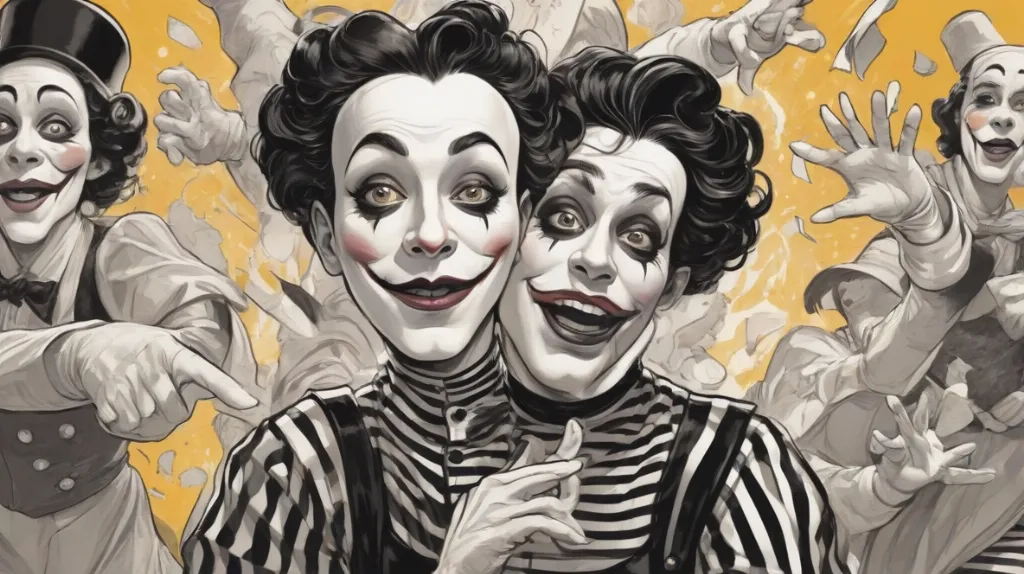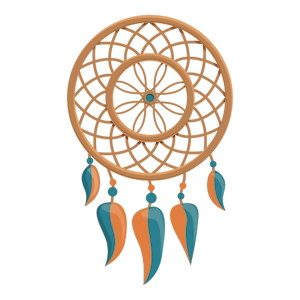What Does It Mean to Dream of Pantomime ?
Posted on: November 3, 2024
Last updated: February 19, 2025
Pantomime symbolizes unexpressed emotions, creativity, and the roles individuals play in life. It reflects a struggle with communication and authenticity, urging the dreamer to explore their true self and artistic potential.

What does Pantomime mean in a dream?
Pantomime in dreams can represent a myriad of emotions and thoughts that are often unexpressed in waking life. It serves as a powerful symbol of communication, or rather the lack thereof, highlighting the importance of non-verbal cues. In many instances, dreaming of pantomime might indicate feelings of frustration or a desire to convey something significant without the right words. The dreamer may be grappling with situations where they feel unheard or misunderstood, leading to a silent struggle that manifests in their subconscious.
This dream element can also signify creativity and the art of expression. Pantomime, being a form of theatrical performance that relies solely on gestures and body language, may suggest that the dreamer has untapped creative potential or a longing to express themselves artistically. In this context, it can encourage the individual to explore new avenues of self-expression that do not rely on verbal communication, thus opening up a world of possibilities.
Moreover, pantomime can symbolize the roles people play in their daily lives. Just as actors embody different characters, individuals may find themselves adopting various personas depending on their surroundings. This dream could reflect an internal conflict regarding authenticity and the desire to break free from societal expectations. It may prompt the dreamer to evaluate their true self versus the roles they feel compelled to perform.
In the realm of a dream book, pantomime carries several connotations that can enrich the interpretation of the dream. These include:
- Unexpressed emotions
- Desire for creativity
- Struggles with communication
- Authenticity versus performance
Understanding these layers can help the dreamer navigate their feelings and experiences, ultimately leading to personal growth and deeper self-awareness.
Meaning in dream books
Psychoanalytic Interpretations of Pantomime in Dreams
Repressed Desires: In psychoanalysis, pantomime can indicate repressed desires or thoughts that the dreamer is not fully aware of. It suggests that there may be a conflict between the conscious and unconscious mind that needs resolution.
Fear of Vulnerability: The presence of pantomime may symbolize a fear of being vulnerable or showing one’s true self. It reflects the dreamer’s struggle with intimacy and the desire to hide behind a facade.
Communication Barriers: Pantomime in dreams can also represent communication barriers in the dreamer’s life. It highlights the challenges faced in expressing oneself and the importance of finding effective ways to communicate feelings and thoughts.
Symbolism of Pantomime in Dreams
Expression of Hidden Emotions: Pantomime in dreams often symbolizes the unexpressed feelings or emotions that the dreamer may be suppressing in their waking life. It suggests a need to communicate more openly and to find ways to express what is truly felt.
Connection to the Unconscious: This element can represent a bridge to the unconscious mind, indicating that there are underlying issues or desires that need to be addressed. The dreamer may be encouraged to explore their inner self and uncover hidden truths.
Social Interactions and Relationships: Pantomime may also reflect the dynamics of social interactions and relationships. It can signify the roles people play in their lives and how they present themselves to others, pointing to the importance of authenticity in connections.
Pantomime in different cultural contexts in dreams
In the realm of dream interpretation, the symbol of pantomime carries a rich tapestry of cultural significance. In Western culture, pantomime is often associated with theatrical performances that communicate through exaggerated gestures and expressions, rather than spoken words. This form of art transcends language barriers, inviting audiences to engage with the emotions and stories conveyed solely through physicality. When one dreams of pantomime, it may reflect a desire for deeper connections or a struggle to express oneself authentically in waking life. The dreamer could be grappling with feelings that are difficult to articulate, seeking a means to convey their inner turmoil.
In Slavic cultures, the concept of pantomime can also be linked to folklore and traditional storytelling. Here, the use of gestures and movements plays a crucial role in conveying moral lessons and cultural values. Dreams featuring pantomime may symbolize a connection to one’s heritage or a call to embrace the wisdom of ancestors. The dreamer might find themselves navigating complex family dynamics or cultural expectations, using the art of pantomime as a metaphor for their own journey of self-discovery.
Eastern cultures often view pantomime as a form of meditation and expression, where silence speaks volumes. In this context, dreaming of pantomime could signify a need for introspection and a deeper understanding of one’s emotions. The dreamer may be encouraged to explore their inner landscape, seeking clarity in the silence that surrounds them. This symbolic representation of pantomime invites the dreamer to embrace stillness and reflect on their true desires and fears.
In various Oriental traditions, the art of pantomime is intertwined with spiritual practices, emphasizing the connection between body and soul. Dreams involving pantomime may suggest a journey towards enlightenment or a quest for harmony within oneself. The dreamer could be on the verge of a significant transformation, where the silent expressions of pantomime serve as a guide to navigate the complexities of their spiritual path. Ultimately, the symbol of pantomime in dreams invites a profound exploration of communication, identity, and the intricate dance of human emotion.
Pantomime in other contexts of use
Pantomime in Dreams: Other Contexts
Experiencing pantomime in a dream can reflect various aspects of communication and expression. Here are 35 contexts in which the element of pantomime may appear in dreams, each with its own symbolic interpretation.
Performing a pantomime
This may symbolize your desire to express emotions that are difficult to verbalize, indicating a need for creative outlets.
Watching a pantomime
Observing a pantomime in a dream can represent your feelings of being an outsider or your fascination with how others communicate.
Pantomime in a theater
This context suggests a search for recognition and validation in your social life, highlighting the importance of public perception.
Pantomime with friends
Engaging in pantomime with friends may indicate a strong bond and the ability to communicate without words, emphasizing trust and understanding.
Pantomime with strangers
This might reflect your feelings of uncertainty in social situations, suggesting a need to navigate unfamiliar environments.
Silent pantomime
A silent pantomime can symbolize suppressed feelings or thoughts that you wish to express but find difficult to articulate.
Pantomime with animals
Incorporating animals into a pantomime may indicate a connection to your instincts and the primal aspects of communication.
Clumsy pantomime
A clumsy performance may represent your insecurities and fears of miscommunication in your waking life.
Masterful pantomime
Exhibiting skill in pantomime suggests confidence in your ability to convey messages and emotions effectively.
Pantomime in a dream competition
Competing in a pantomime can symbolize your drive for success and recognition in your personal or professional life.
Pantomime with exaggerated gestures
Exaggerated movements may reflect your emotions being heightened or a need for more dramatic expression in your life.
Pantomime in a foreign language
This context can signify feelings of alienation or the challenge of understanding others in your environment.
Pantomime as a form of therapy
Using pantomime therapeutically in a dream may indicate a healing process, allowing you to confront and express repressed emotions.
Children performing pantomime
Seeing children engage in pantomime can symbolize innocence and the pure, unfiltered expression of feelings.
Pantomime in a dream party
A party setting suggests a social atmosphere where non-verbal communication plays a crucial role in connecting with others.
Pantomime with masks
Wearing masks during a pantomime can represent hidden aspects of your personality or feelings you are not ready to reveal.
Pantomime in a dream about love
This context may indicate the complexities of romantic communication and the importance of non-verbal cues in relationships.
Pantomime as a form of protest
Using pantomime to convey a message of dissent in a dream may symbolize your desire to challenge the status quo.
Pantomime in a dream of confusion
A confusing pantomime may reflect your feelings of being misunderstood or struggling to convey your thoughts clearly.
Pantomime with props
Incorporating props can symbolize the tools you use in your life to express yourself and communicate with others.
Pantomime in a dream of nostalgia
This may indicate a longing for simpler times when communication was more straightforward and less complicated.
Pantomime in a dream of celebration
Celebratory pantomime suggests joy and the importance of shared experiences in your life.
Pantomime as a form of storytelling
Using pantomime to tell a story in a dream may reflect your desire to share your narrative without relying on words.
Pantomime with emotional themes
Exploring deep emotions through pantomime can indicate a need to process feelings that are difficult to articulate.
Pantomime in a dream of transformation
This context may symbolize personal growth and the evolution of your communication style.
Pantomime as a cultural expression
Engaging in culturally specific pantomime can highlight your connection to your heritage and the importance of cultural identity.
Pantomime in a dream of conflict
Conflict expressed through pantomime may indicate unresolved issues in your life that require attention.
Pantomime in a dream of exploration
This context suggests a journey of self-discovery and the exploration of new forms of communication.
Pantomime with a mentor
Learning pantomime from a mentor in a dream may symbolize guidance in navigating complex social dynamics.
Pantomime in a dream of freedom
This context can represent liberation from the constraints of verbal communication, allowing for authentic expression.
Pantomime as a reflection of self
Engaging in pantomime can symbolize self-reflection and the exploration of your inner thoughts and feelings.
Pantomime in a dream of connection
This may indicate a strong desire to connect with others on a deeper, more emotional level.
Pantomime in a dream of creativity
Using pantomime as a creative outlet can symbolize your artistic aspirations and the importance of self-expression.
Pantomime as a form of escapism
Engaging in pantomime may represent a desire to escape from reality and explore different facets of your personality.
Pantomime in a dream of unity
This context suggests a collective understanding and shared experiences with those around you.


Comments posted under the entry: 0
The user must be logged in to comment or view comments.